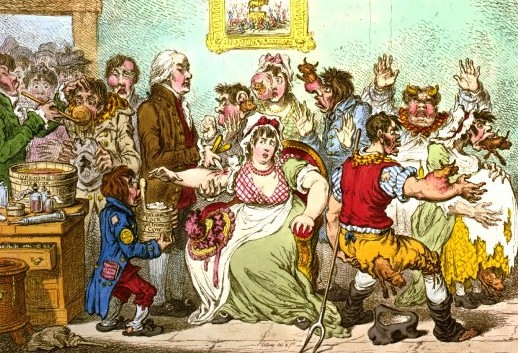In 2009, The New York Times ran a story which renewed the debate some parents have over whether or not to allow doctors to vaccinate their children against the flu and childhood diseases.

Early Cow Pox Vaccination
This particular story concerned a vaccination for the H1N1 flu.
“Barbara Loe Fisher,” The Times writes (Oct. 16, 2009, president of the National Vaccine Information Center, an advocacy group that questions the safety of vaccines, said the swine flu has ‘breathed new life’ into the cause. ‘People who have never asked questions before about vaccines are looking at this one,’ Ms. Fisher said.
The Times adds, “The increased interest is frustrating to health officials, who are struggling to persuade an already wary public to line up for shots and prevent the spread of the pandemic. According to a CBS News poll conducted last week, only 46 percent said they were likely to get the vaccine. The nationwide poll, which has a margin of sampling error of plus or minus three percentage points, found that while 6 in 10 parents were likely to have their children vaccinated, less than half said they were ‘very likely to.’
“ ‘I wonder if the people disseminating this false information about this vaccine realize that what they are doing could result in some people losing their lives,’ said Dr. Jonathan E. Fielding, the director of the Department of Public Health for Los Angeles County.”
TIME magazine took a recent look (Oct. 6) at the issue and the results and conclusions were surprising. Who would think that a vaccine for your child was bad?
“That’s what the people behind the anti-vaccine movement would have me believe, but I knew better–and for a long time, so did most American parents. In 1952 there were 57,879 cases of paralytic polio in the U.S. By 1961, just six years after the vaccine was introduced, the number was 1,312–a 98% reduction. Today the figure is zero. In the 1950s, before the introduction of the measles vaccine, 3 million to 4 million Americans contracted the disease each year and 48,000 were hospitalized. In 2012 there were just 55 cases.
“But recent outbreaks of measles in New York City and Orange County, California; whooping cough throughout the entire state of California; and mumps in the communities around Ohio State University in Columbus suggest that the hard-learned lesson that vaccines are not only safe but also critical to the health and safety of all children is being unlearned.”
But here’s the surprising information.
“Doctors who treat cardiovascular disease worry most about the U.S.’s so-called stroke belt in the Deep South, where obesity rates are highest and eating habits are, broadly speaking, poorest. The anti-vaccination movement is more a scourge of blue states. Its adherents are primarily well-educated and comparatively affluent people who consider themselves well informed. But they’re doing a lot of damage–and the numbers explain why.
“For most diseases, vaccination rates must remain very high–up to 95% in some cases–to establish what’s known as herd immunity, the protection provided by an entire community to the handful of people who can’t be vaccinated because of a demonstrable medical condition. In the U.S. at large, the numbers are pretty good, with close to 95% of incoming kindergartners in compliance with vaccine guidelines, according to a 2012–13 survey from the U.S. Centers for Disease Control and Prevention (CDC).
“But that figure conceals a lot of holes. Louisiana has an impressive 96.6% rate for the measles, mumps and rubella (MMR) vaccine and a 98.3% rate for diphtheria, tetanus and pertussis. Mississippi leads the nation with a near perfect 99.9% for both. California, meanwhile, clocks in at just 92.7% and 92.5%, and Colorado rolls in last at a woeful 85.7% and 82.9%.”
So why do so many smart parents opt-out of having their child vaccinated?
“There are a lot of theories about why vaccine denialism is such a problem in left-leaning communities, and one of the most persuasive is the master-of-the-universe phenomenon. The wealthier you are and the higher your education level, the more you lose sight of the randomness of misfortune and come to believe you can control variables and eliminate risk.
“ ‘When people achieve a certain status, they think they’re invincible,’ says Roberts. ‘They think it will never happen to them, and if it does, they’ll have the resources to deal with it.’ ”
“The arguments that have been central to the anti-vaccine movement for decades are familiar: The shots are overused and teeming with toxins. They cause autism, bipolar disorder, ADHD, allergies and more. They are profit centers for greedy doctors and Big Pharma, and everybody’s keeping the dangers quiet. ‘The conspiracy theories come up a lot,’ says Joan Bowe, director of personal health for the Delaware County General Health District in Ohio, which was hit by the mumps epidemic earlier this year. ‘They usually involve the government wanting the vaccines out there.’
“None of that is true, but that doesn’t mean the rumormongers are ill-intentioned. Even epidemiologists and school administrators agree that antivax parents are motivated by nothing more than what they think is right–despite the science showing they are wrong.
‘These are good families trying to make the best call they think they can for their kids,’ says Paul Craft, the superintendent of schools in Delaware County. The idea that their best call is in fact the worst one doesn’t always get through, partly because there are doctors willing to back up vaccine opponents.
“…those who support vaccines–have a number of ways to deal with patients who believe the shots are dangerous. Some simply refuse to treat the family, which handles the entire matter neatly but squanders the chance to change the patients’ minds when they come in for visits. Others seek to engage.
“ ‘Our strategy has been to give them science-based resources as opposed to the other things they’ve been hearing,’ says Dr. Bonnie Pugh, a member of a Columbus-area practice. ‘We have had some people turn around.’ ”
What are some communities doing to combat this notion?
“The vaccine opponents are not going away anytime soon, though encouragingly, some are going dark. Playboy model and talk-show host Jenny McCarthy, who more than anyone else lit the antivax fires, speaks little of the matter anymore. Parents who don’t vaccinate increasingly complain that they are becoming pariahs in their communities, resented by parents who seek to protect their own children and see the antivax parents as undermining their efforts. Some doctors view this kind of impromptu, parent-on-parent persuasion as the best way to bring vaccine opponents around.
“None of that, of course, is of interest to a virus, a mindless clump of deadly nothing that knows how to do exactly one thing: replicate itself inside a living organism. The fight should not be a fair one, because one of those infectible organisms–the human being–has the power to think and reason and choose. Vaccines give us the once unheard-of power to choose health. It’s a choice doctors are fighting to help more and more people make.”
Information is power, and I’m all for everyone co-working with doctors when it comes to their own health. I subscribe to The Berkeley Wellness Letter, a monthly newsletter that discusses a range of issues using scientific research in easy to understand language. I recently went to my internist and showed him an article where, according to recent studies regarding diverticulosis, patients with the condition need not avoid nuts and seeds, as was recommended in the past.
My doctor’s assessment? “I’ve personally had cases where seeds and nuts have contributed to diverticulitis – inflammation of the diverticula.”
While I believe in researching and reading as much as I can, at the end of the day, I go with what my own doctor says. That doesn’t mean that I won’t seek another opinion from say, my gastroenterologist. Combined, their real-world experience trumps anything else I read.
When it comes to vaccinations, adults have the right to make their own choice on health issues. When it comes to the long-term health of your child, doctors know best, period.
Comments









